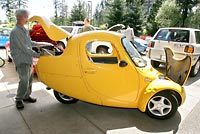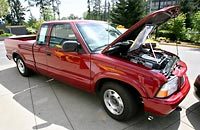 |
|
|
|
|
|
|
Friday, June 13, 2008 - Page updated at 12:03 PM Fans of plug-in cars build their power baseSeattle Times staff reporters
Sometime in the future, your car may make your round-trip commute with electricity generated from rooftop solar cells. When you want to venture east of the Cascades for a weekend winery tour, an internal-combustion engine — powered by biofuels — would kick into action. This vision has helped propel plug-in hybrid cars from a footnote in automotive technology into a serious alternative that car manufacturers are working to bring to market within the next five to 10 years. Meanwhile, a grass-roots network of plug-in converts — professors, students, garage mechanics and others — is already fashioning the first generation of these vehicles in hopes of prodding the industry into faster action. They say these cars can get more than 100 miles per gallon for some travel. We're asking readers to join a monthlong challenge to reduce their individual greenhouse gas emissions.
"We have proved that we can make good-enough plug-in hybrids now, and don't have to develop a whole new vehicle," said Felix Kramer, founder of the California Cars Initiative, which converts standard Toyota Prius hybrids to operate as plug-in cars. Kramer spoke at a Monday conference that drew more than 300 people — including automotive-industry representatives, federal and state officials — to the Microsoft campus in Redmond. The conference was sponsored by the Cascadia Center of Discovery Institute, a Seattle-based think tank. Auto-industry officials maintain there are still significant obstacles to mass-producing these vehicles. And electric energy may not be renewable. It often comes from coal-fired and gas-fired power plants that still rely on fossil fuels. But interest in this technology has intensified as gas prices climb to record highs and concerns about global warming increase. Some local governments are planning to purchase fleets of plug-in hybrids that could stimulate the markets and further refine the technology. "We're committed to plug-in hybrids," said King County Executive Ron Sims. There is hope that the Northwest — with Microsoft and other high-tech companies providing plenty of brain power — could emerge as a hub of innovation to spur development of plug-ins. The cars, for example, could be equipped with metered smart chips that could allow the batteries to sell back small amounts of electricity to the grid. Motorists might be able to earn several thousand dollars a year and also help stabilize the regional power system.
The plug-ins attempt to build on the success of the current generation of hybrid cars, such as the Toyota Prius. In the first four months of this year, the Prius surpassed the Camry to emerge as the top-selling Toyota in the Northwest, according to Buzz Rodland, of Rodland Toyota in Everett. "This is an astounding achievement," Rodland said. The Prius has a small electric battery that, working on its own, can power the vehicle for only a couple of miles. The Prius has no plug-in battery, so the battery maintains its charge with the aid of the car's gasoline-powered internal-combustion engine. Some see the plug-ins as an end unto themselves, while others see a step on the way to all-electric vehicles, some of which were on display Monday. Auto-industry officials say one of the biggest obstacles to plug-in hybrids is the further development of long-lasting, lightweight lithium batteries at an affordable price. "My challenge right now is that I have to get a battery pack, and I am working my butt off to ensure that we do have a battery pack," said Nick Zielinski, an engineer for General Motors. GM is developing a plug-in Saturn and an ambitious new vehicle known as the Chevy Volt, which could run on electricity or biofuels. Zielinski hopes the vehicles could be available within the next five to 10 years. Others say current technology is sufficient to launch plug-in technology. University of California students have worked with their professors to build prototypes. And a small cottage industry has emerged to convert, with the aid of additional battery packs, a standard Prius into plug-in vehicles that can get substantially better gas mileage. The conversions, however, void the Toyota warranty for the vehicles. "The official me says you shouldn't be doing this," said Bill Reinert, a Toyota engineer. "The unofficial me says these guys are cool, but the official me has to win out." A study released earlier this year by the Richland-based Pacific Northwest National Laboratory said that if the current U.S. car, pickup and sport-utility vehicle fleet was converted to plug-in technology, the electrical system could power most of these cars for 33 miles per day. The plants would have to run more intensively, generally using more fossil fuels. The study found the conversion would reduce greenhouse-gas emissions, in some regions by as much as 40 percent. But the increased use of coal to generate electricity would cause substantial increases in a significant pollutant — sulfur oxides — in the areas around the power plants. Some imagine a future where panels of photovoltaic solar cells sprout on top of homes and office buildings to provide new sources of clean power for plug-in hybrids or all-electric cars. "Today's sun will give you tomorrow's driving," predicted Andrew Frank, a University of California at Davis professor. Hal Bernton: 206-464-2581 or hbernton@seattletimes.com Copyright © 2007 The Seattle Times Company Most read articles
|
Seattle Times Special
Miracle Machines: The 21st-Century Snake Oil
The Favor Factory
Confronting Malaria
Pike Place Market
Your Courts, Their Secrets
License to Harm
The Bering Sea
Olympic Sculpture Park |











